Overview
This article offers vital insights into the VA disability rating for Irritable Bowel Syndrome (IBS) among veterans. We understand that navigating the rating criteria can be challenging, especially when establishing a service connection. It's important to know that thorough documentation and a clear understanding of the new rating system, effective from May 2024, can significantly improve your chances of receiving the benefits you deserve.
Many veterans may not realize they are eligible for increased ratings or presumptive conditions, and we want to ensure you are informed and supported on this journey. Remember, you are not alone in this process, and we're here to help you every step of the way.
Introduction
Irritable Bowel Syndrome (IBS) affects many veterans, yet countless individuals remain unaware of their eligibility for VA disability benefits. We understand that navigating this journey can be overwhelming. As the VA refines its rating criteria and streamlines the claims process, it's essential to empower veterans with insights that can help them approach their claims with confidence.
How can you effectively leverage the new rating structures and support systems to secure the benefits you deserve? We recognize that documenting your condition can be challenging, but you are not alone in this journey. Together, we can explore the resources available to you.
Turnout: Streamlining Your IBS VA Disability Claim Process
Turnout harnesses AI technology to simplify the IBS VA disability rating application process, making it more accessible for service members. By automating document management and case tracking, Turnout ensures that former service members receive timely updates and assistance throughout their application journey. This innovative approach significantly reduces the bureaucratic hurdles that often hinder requests, allowing veterans to focus on their health and well-being while Turnout expertly navigates the complexities of the system.
Recent advancements in the VA's application processing have led to an impressive average processing time of just 94.8 days as of August 2025, a remarkable improvement from previous averages. The VA has successfully processed over 2.524 million requests in record time, underscoring the effectiveness of automation tools in accelerating the process.
Veterans have expressed their gratitude for these technological improvements, noting that they alleviate the stress associated with managing the application process. With Turnout's support, service members can pursue their benefits with confidence, knowing they have a dedicated partner to guide them through the system's intricacies, utilizing trained advocates without the need for legal representation. It's important to remember that Turnout is not a law firm and does not provide legal advice.
We understand that navigating the VA system can feel overwhelming, but you are not alone in this journey. Turnout is here to help you every step of the way.
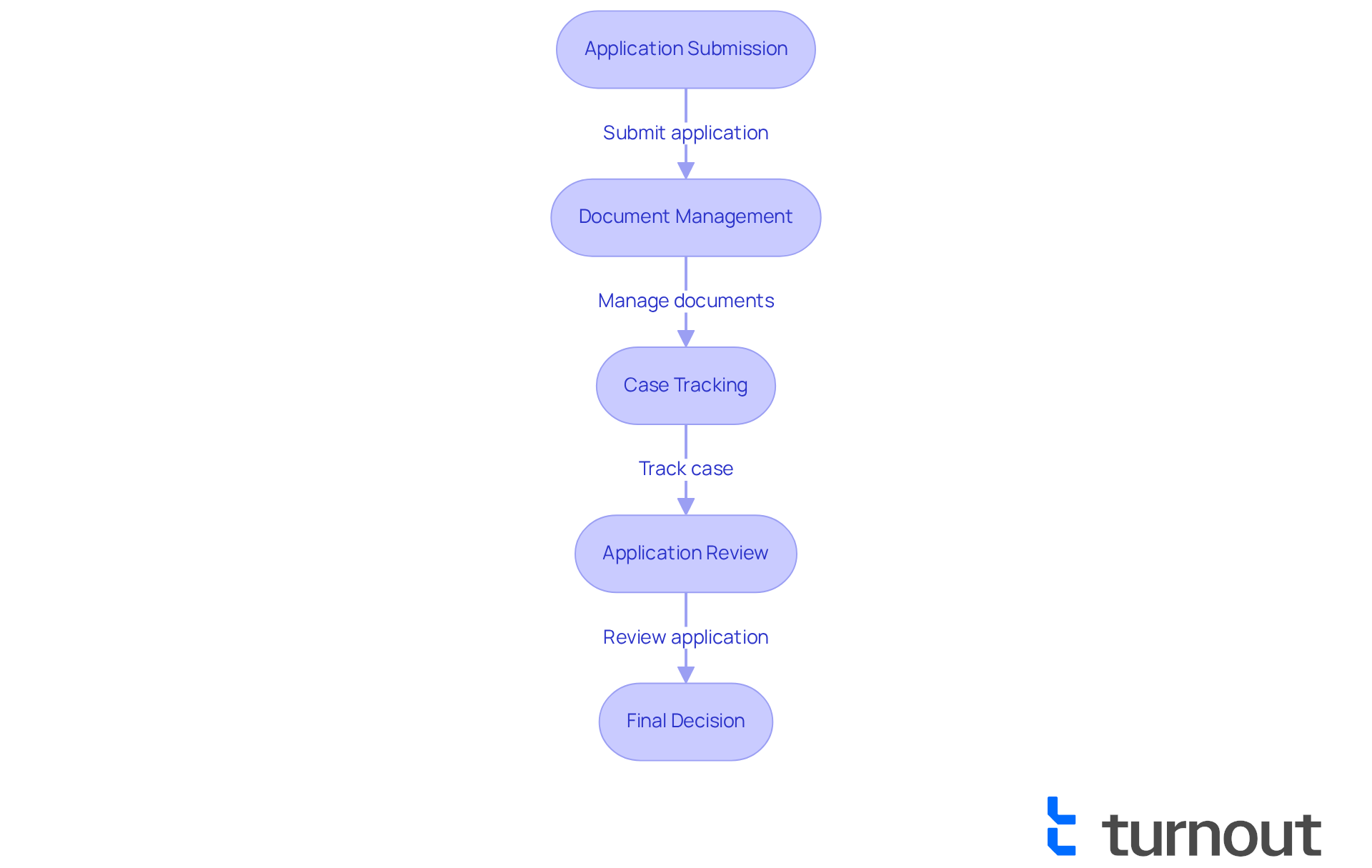
VA Rating Criteria for Irritable Bowel Syndrome: What You Must Know
Irritable Bowel Syndrome (IBS) affects many veterans, and the IBS VA disability rating is assigned by the VA on a scale from 0% to 30%, depending on symptom severity and frequency. Starting May 19, 2024, ratings will be categorized as follows:
- 10% for mild symptoms
- 20% for moderate symptoms
- 30% for severe symptoms that significantly impact daily life
We understand that navigating these ratings can be overwhelming, but it’s essential to provide thorough documentation of your condition when filing a claim.
Did you know that as many as one-third of women in the Armed Forces experience IBS? This highlights how common this condition is among former service members. If you currently have a 0% IBS VA disability rating, you can seek an increase under the new criteria. Many may not be aware of this option, but understanding these standards can help you confidently navigate the application process and support your entitlement to the benefits you deserve.
As noted by a reliable source, "If an individual with military experience developed IBS due to another condition linked to their duty, such as post-traumatic stress disorder (PTSD), they may be eligible for disability benefits based on secondary connection." This emphasizes the importance of connecting your circumstances when submitting requests. Remember, you are not alone in this journey, and we’re here to help you every step of the way.
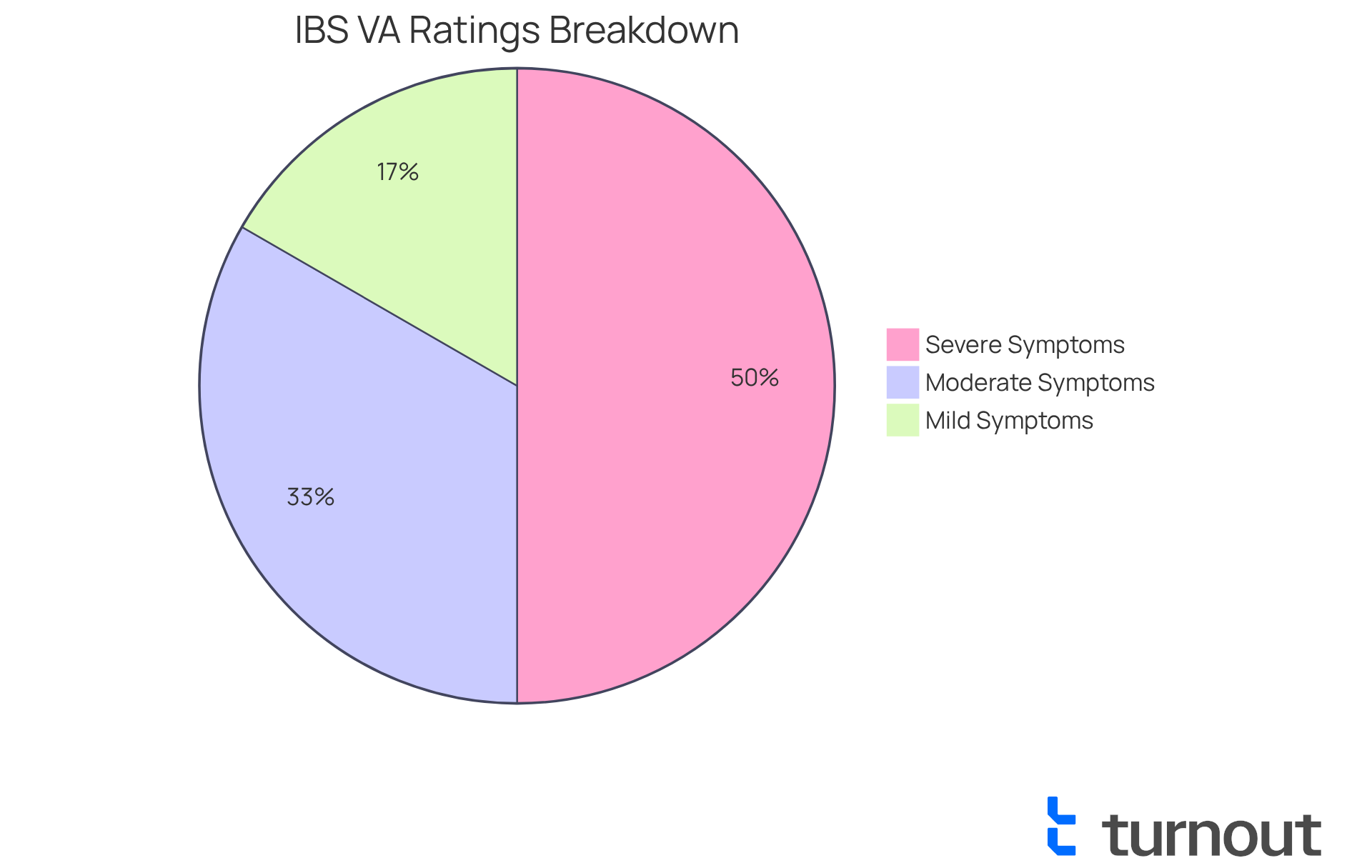
Establishing Service Connection for IBS: Steps and Requirements
Creating a connection for irritable bowel syndrome (IBS) VA disability rating can feel overwhelming, but it's essential to demonstrate a clear relationship between your condition and military duty. This process typically involves submitting medical records that confirm a diagnosis of IBS, along with a detailed treatment history. A crucial element of your assertion is a nexus letter from a healthcare provider, explaining how your IBS relates to your military experience. For instance, individuals with PTSD may find that their IBS symptoms worsen due to their mental health condition, which can provide a secondary connection for support.
Collecting thorough evidence is vital for a successful case. Did you know that approximately 230,000 former military personnel currently receive benefits for IBS? This highlights the prevalence of this condition among service members. Veterans have shared that comprehensive documentation and clear medical opinions greatly enhance their chances of approval. One individual noted, 'Navigating the VA necessitates knowledge that many of us lack,' emphasizing the importance of having informed assistance during the application process.
Successful claims often hinge on well-prepared nexus letters that clearly link the IBS VA disability rating to specific in-service events or conditions. For example, an individual who developed IBS due to medication for PTSD was able to establish a connection by providing supporting medical documentation. This illustrates the importance of not only obtaining a diagnosis but also linking it to military involvement through reliable medical evidence. Remember, the maximum IBS VA disability rating a former service member can receive for service-connected IBS is 30%, applicable if the symptoms are classified as severe.
You are not alone in this journey, and we're here to help you navigate the process.
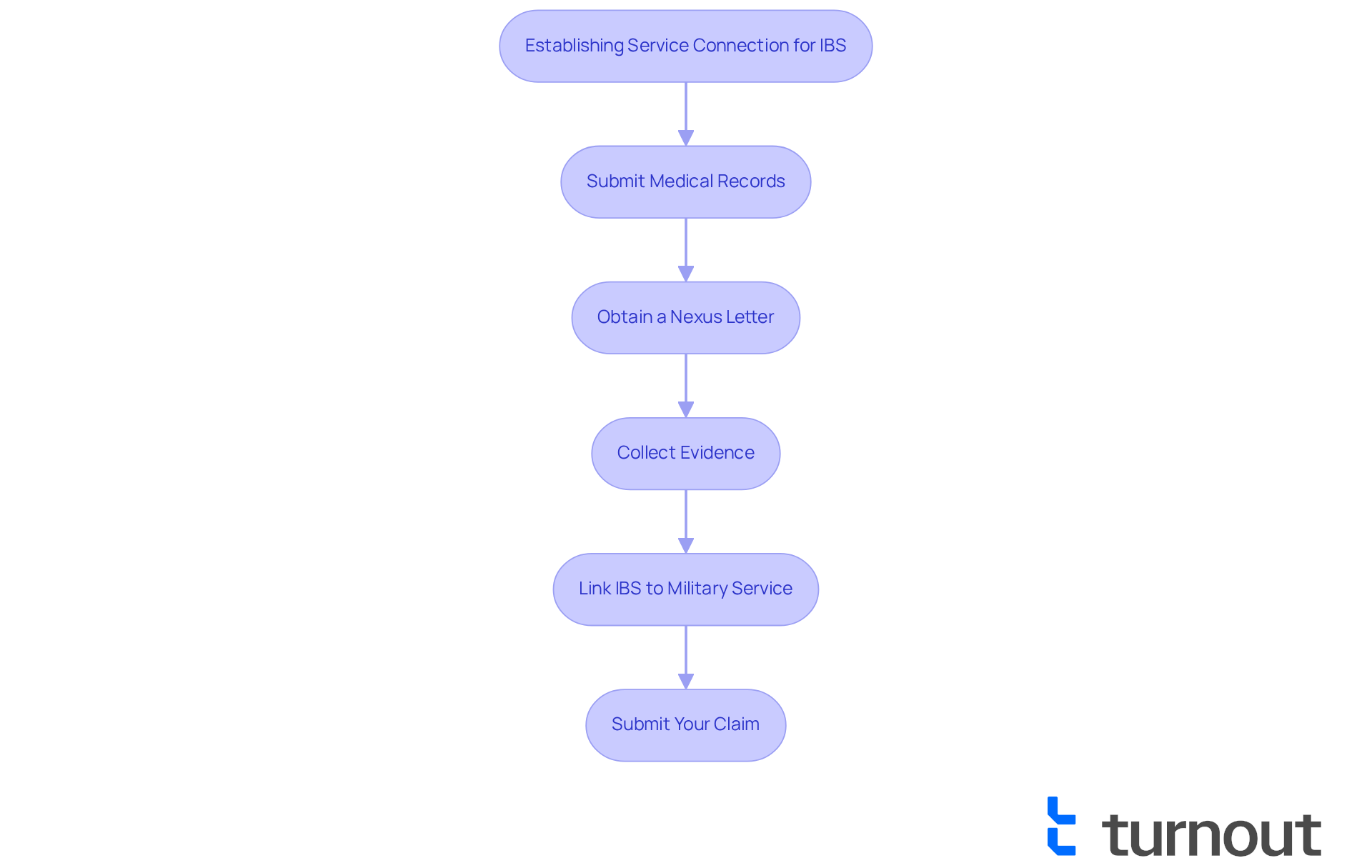
Direct vs. Secondary Service Connection for IBS: Key Differences
Irritable Bowel Syndrome (IBS) can be a challenging condition, especially for those with military experience. It's important to recognize that a direct link exists between IBS and military duty. If you have served, you may need to provide proof connecting your IBS symptoms to specific incidents or injuries from your time in service.
On the other hand, some individuals may experience IBS as a secondary condition. This occurs when IBS is caused or worsened by another service-related issue, such as PTSD or chronic pain. Many veterans have successfully claimed IBS as a secondary condition, showing how their primary service-related challenges contributed to its development.
We encourage veterans to thoroughly evaluate their medical history and gather relevant documentation. Understanding whether your connection to IBS va disability rating is direct or secondary is crucial, as it can significantly influence your application process. Remember, grasping these distinctions is essential, as they can impact the outcomes of your claims and the ibs va disability rating benefits you may receive.
You are not alone in this journey, and we’re here to help you navigate these challenges. Take the time to explore your situation and know that support is available to you.
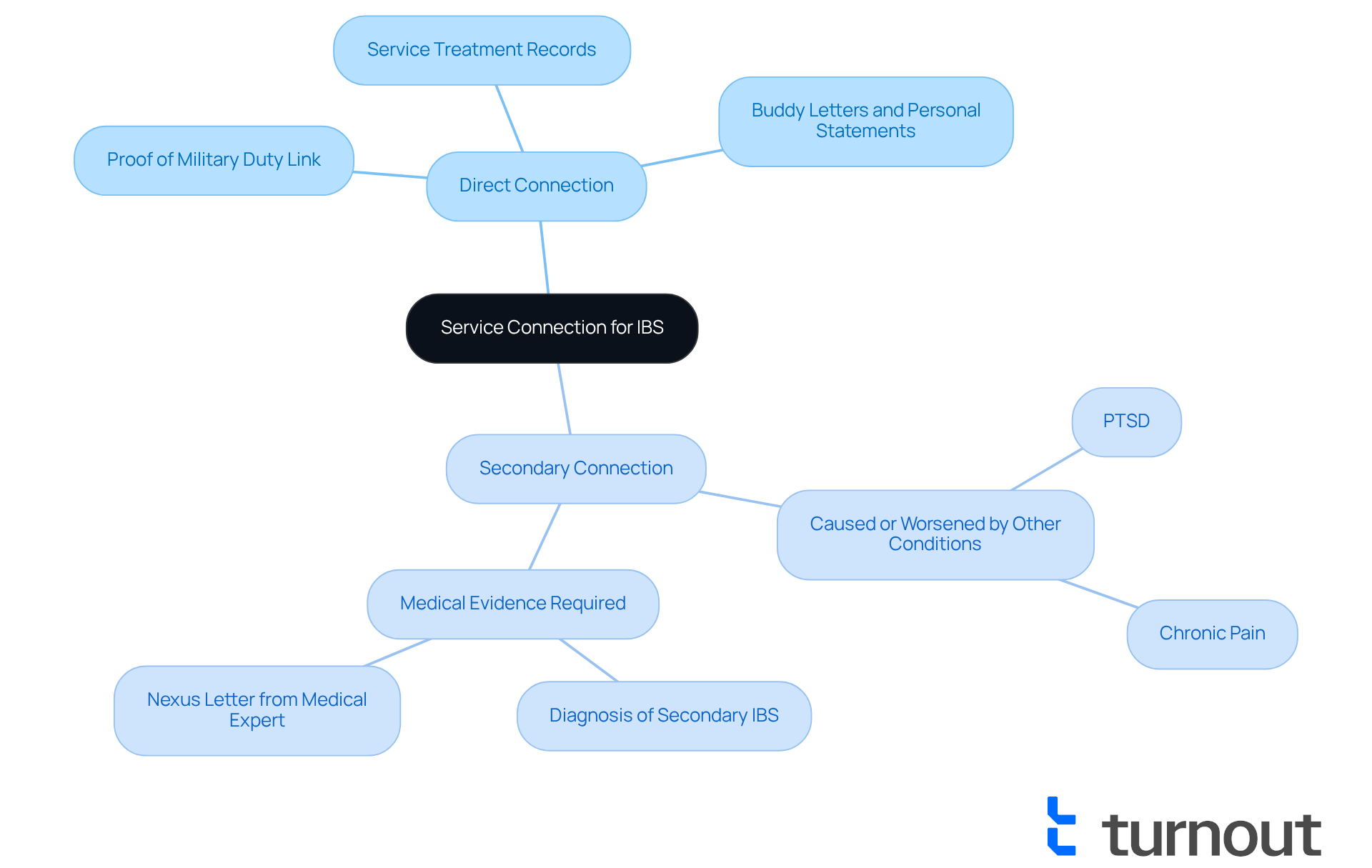
Presumptive Conditions for IBS: Are You Eligible?
Some former military personnel may be eligible for presumptive connections for IBS, especially those who served in specific settings, such as Gulf War participants or ex-prisoners of war (POWs). If an experienced member meets the criteria for a presumptive condition, they do not need to provide extensive evidence connecting their IBS to duty. This makes the claims process more straightforward and less daunting.
For Gulf War participants, establishing a service connection for IBS requires demonstrating just two aspects, highlighting the ease of the process for this group. We understand that navigating these options can be overwhelming, so it’s crucial for former service members to review the [VA's presumptive conditions list](https://myturnout.com/resources) to determine if they qualify.
The VA acknowledges that the IBS VA disability rating is a presumptive condition for Gulf War service members, significantly streamlining the claims procedure. Unfortunately, statistics suggest that many former service members may be unaware of their eligibility, potentially missing out on benefits due to insufficient information. For instance, veterans identified with IBS during active duty or those who participated in the Gulf War can demonstrate a link to their duties without the need for extensive documentation.
Additionally, the VA's official disability rating for IBS varies from 0% for mild cases, 10% for moderate cases, and 30% for severe cases, depending on the frequency and severity of symptoms. Understanding these criteria is essential, as is collecting necessary documentation, such as service medical records and buddy statements, to substantiate requests effectively. Buddy statements can confirm the daily impact of IBS symptoms, further reinforcing assertions.
We encourage veterans to familiarize themselves with the VA's guidelines and understand their rights under the Appeals Modernization Act (AMA). By doing so, they can maximize their chances of receiving the benefits they deserve. Remember, you are not alone in this journey, and we're here to help you navigate it.
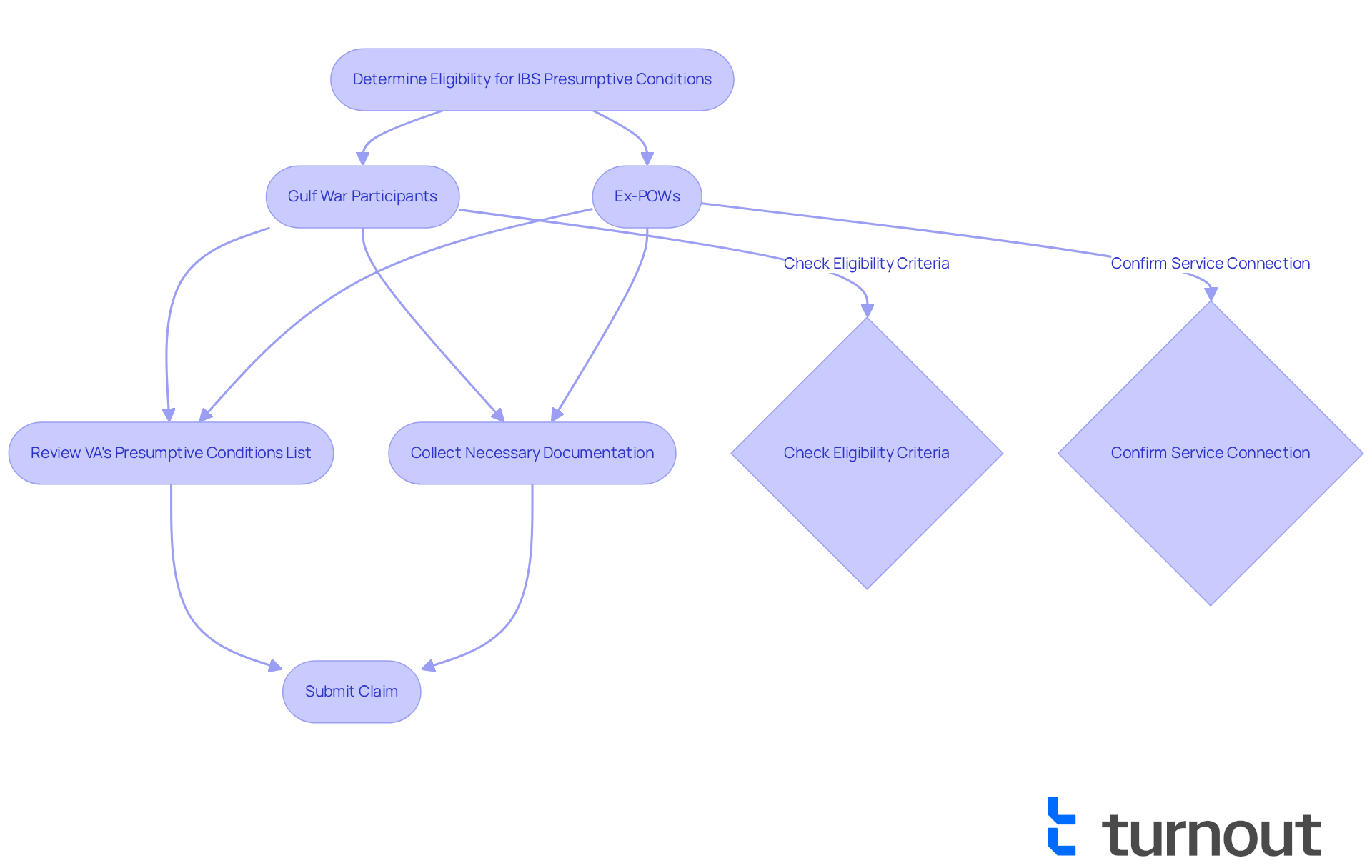
Understanding IBS Symptoms and Types: A Guide for Veterans
Irritable Bowel Syndrome (IBS) can manifest in several ways, such as:
- abdominal pain
- bloating
- gas
- diarrhea
- constipation
We understand that these symptoms can be challenging to navigate. There are three primary types of IBS:
- IBS with constipation (IBS-C)
- IBS with diarrhea (IBS-D)
- mixed IBS (IBS-M)
Recognizing these symptoms and categories is vital for veterans when discussing their condition and IBS VA disability rating with healthcare professionals. This understanding can help you articulate how IBS affects your daily life more clearly. Remember, you're not alone in this journey, and we're here to help you every step of the way.
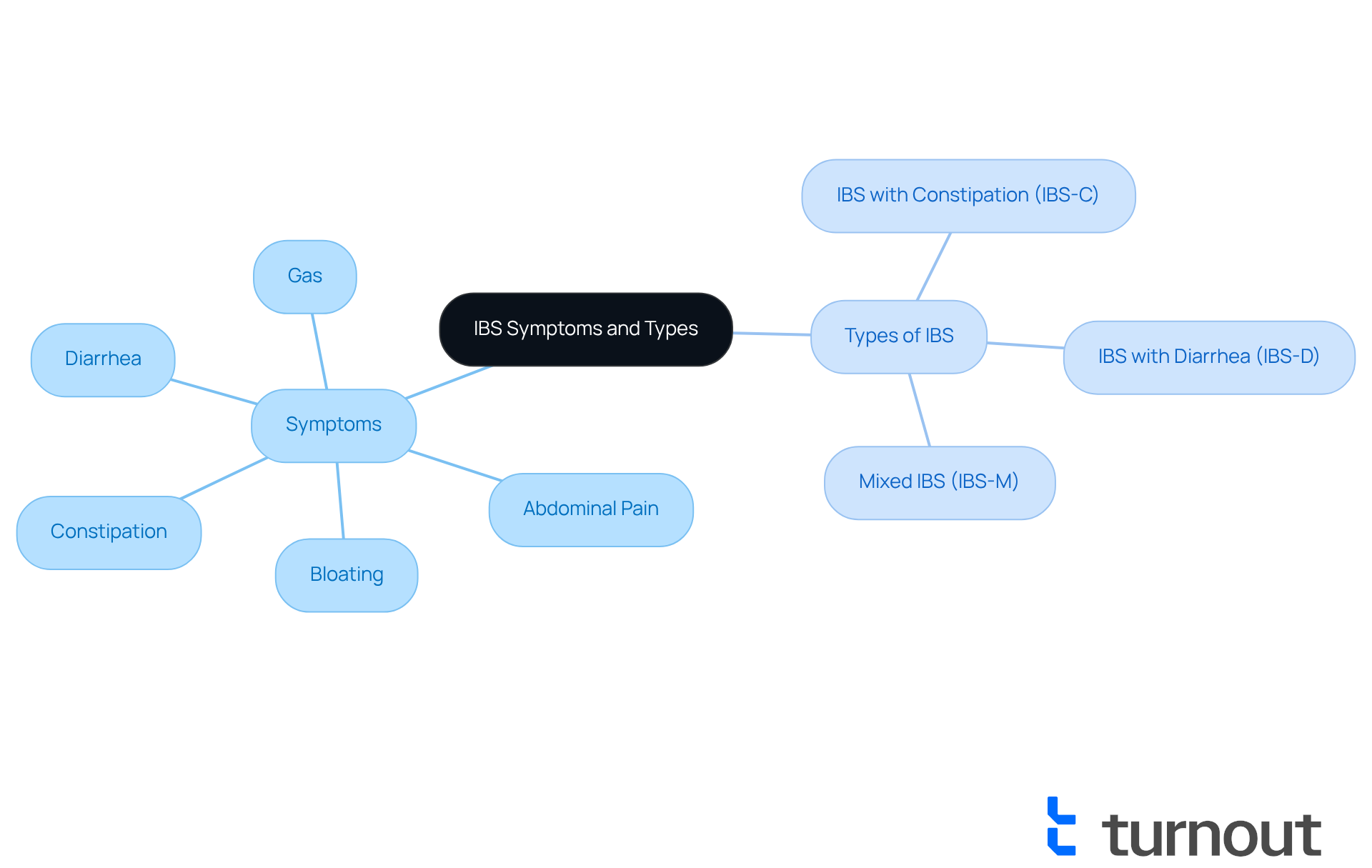
Navigating the Appeals Process for Denied IBS Claims
If your request for Irritable Bowel Syndrome (IBS) has been denied, know that you have the right to contest this decision. We understand that receiving a denial can be frustrating and disheartening. The first step in the appeals process is to carefully review the denial letter to grasp the reasons behind it. Gathering additional evidence, such as medical records and service documents, can significantly strengthen your case. The initial formal action you will take is submitting a Notice of Disagreement (NOD), which expresses your intent to challenge the decision.
You have several options for appealing:
- Request a Higher-Level Review (VA form 20-0996), where a senior VA employee will reassess your request based on the evidence already submitted.
- Appeal directly to the Board of Veterans' Appeals (BVA) using VA form 10182.
Each option comes with specific requirements and deadlines, so it’s crucial to act promptly to avoid missing important filing dates.
Collaborating with advocacy groups can provide essential support during this process. Many veterans who have successfully appealed their IBS VA disability rating claims emphasize the importance of comprehensive documentation and timely responses to VA requests for further information. By keeping thorough records and remaining engaged, you can significantly improve your chances of a successful appeal. Additionally, you may also request an informal conference during a Higher-Level Review to discuss your case directly with the reviewer. Remember, you are not alone in this journey; we’re here to help you navigate the complexities of your appeal.
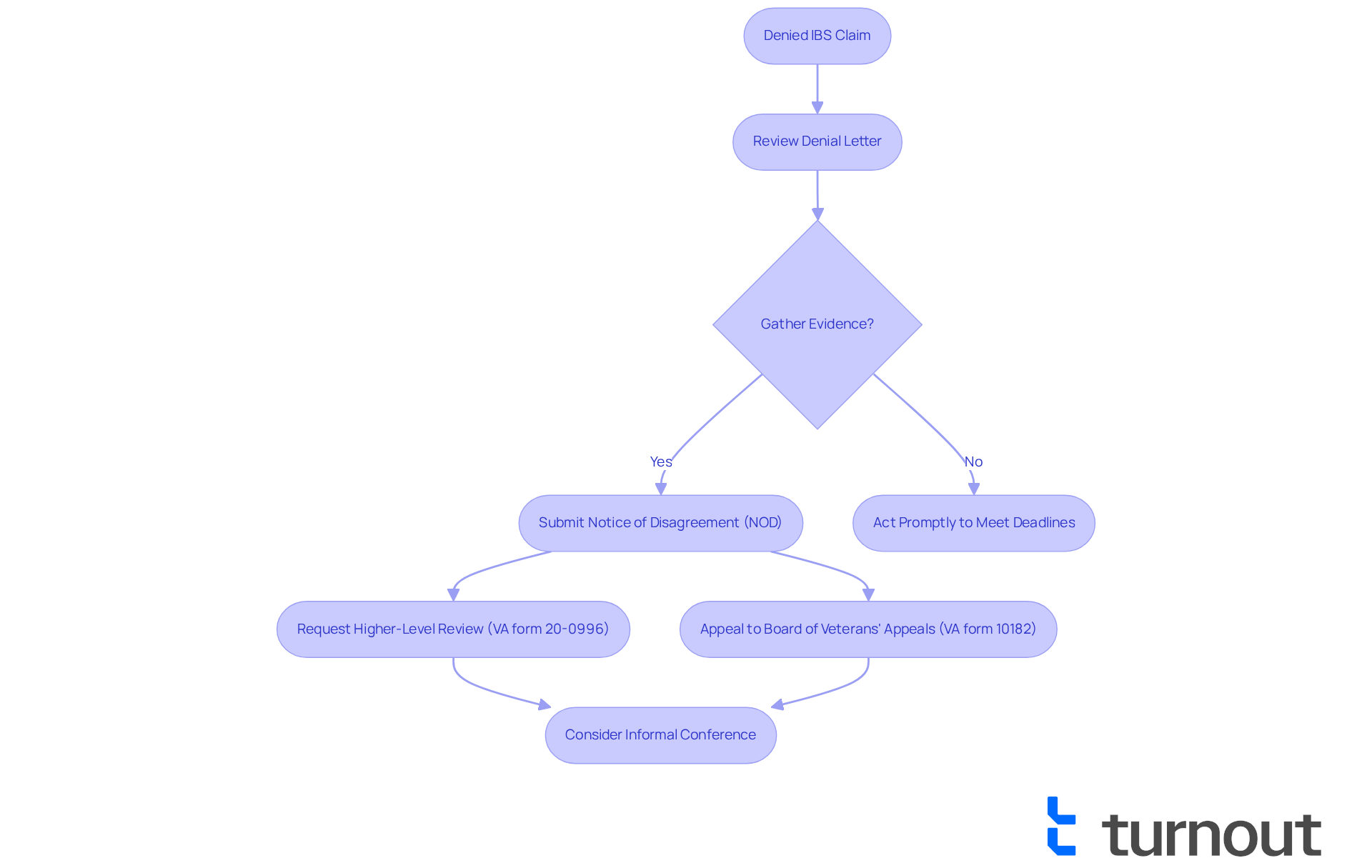
Building Your Case: Essential Medical Documentation for IBS Claims
To construct a strong argument for an IBS request, we understand that former service members face unique challenges. Collecting thorough medical records—such as diagnosis reports, treatment histories, and pertinent test results—is essential. A crucial component of this process is maintaining a symptom diary that meticulously tracks the frequency and severity of IBS episodes. This diary not only supports your assertion but also vividly illustrates how IBS affects your everyday life, which is crucial for the VA's assessment.
It's common to feel embarrassed discussing IBS symptoms, but overcoming this barrier is vital for seeking help. Creating a connection between military service and IBS VA disability rating is essential for securing your case. Many veterans have found that maintaining detailed records significantly enhances their chances of receiving an IBS VA disability rating. One experienced individual remarked, 'The more I recorded my symptoms, the clearer it became how significantly IBS impacted my work and daily activities.'
Buddy statements from partners, friends, or coworkers can also offer extra backing for your assertion. Remember, it's important that symptoms have lasted at least six months and are unexplained by any other medical condition. Initial denial of requests is frequent, and we encourage former service members to submit High Level Reviews (HLR) to bolster their cases. Such personal accounts underscore the necessity of thorough documentation in navigating the claims process effectively. You are not alone in this journey, and we're here to help.
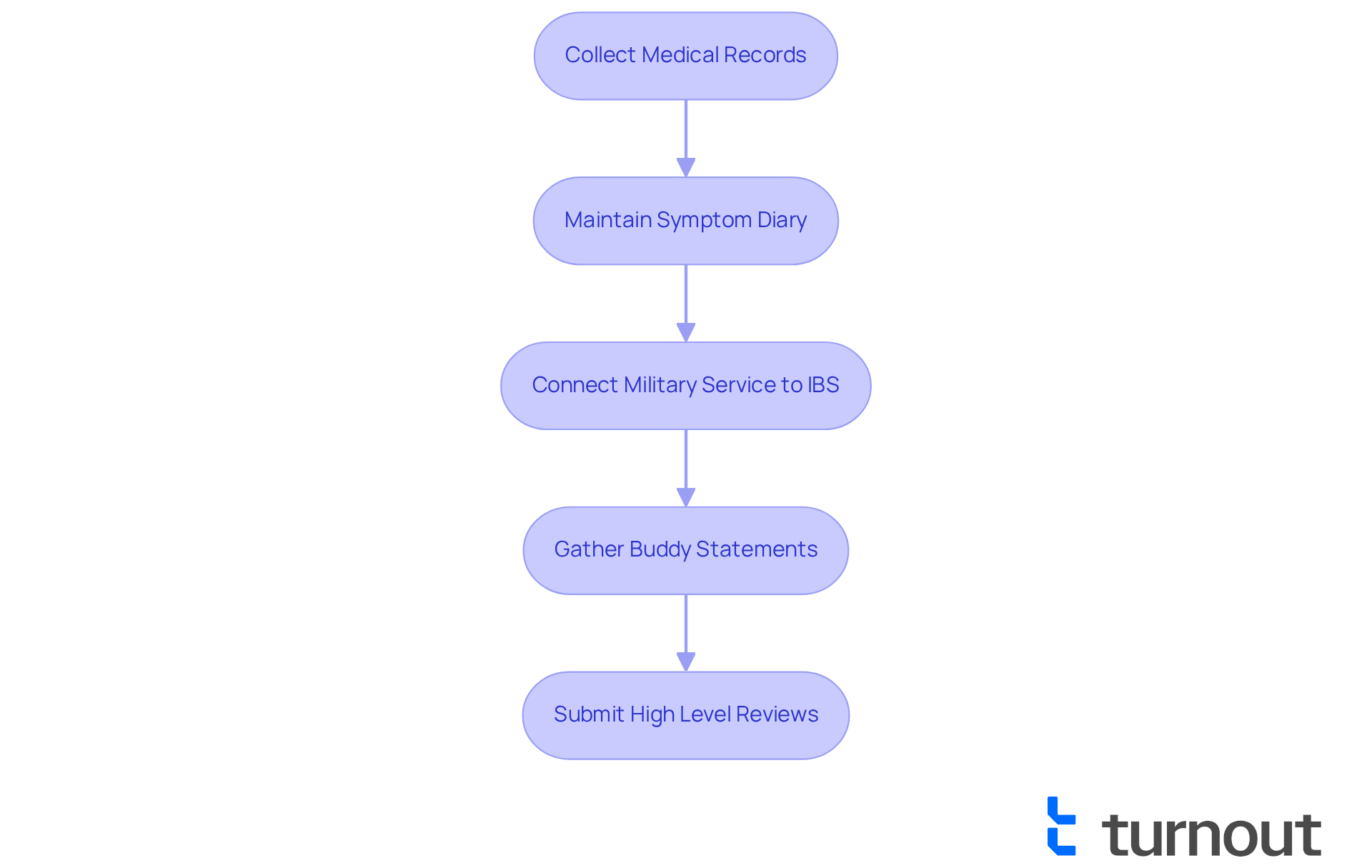
The Impact of IBS on Veterans: Daily Life and Employment Challenges
Irritable Bowel Syndrome (IBS) can deeply affect your daily life, impacting your ability to work, socialize, and engage in activities you enjoy. Frequent abdominal pain and unpredictable bowel movements often lead to missed workdays and strained relationships. Did you know that nearly 1 in 3 former service members meet the Rome IV criteria for IBS? This statistic highlights how common this condition is within the military community.
Personal stories reveal the real-world impact of IBS. One individual shared that their symptoms intensified during periods of increased PTSD, making it difficult to maintain a stable routine. Another experienced individual noted that the unpredictability of their condition often left them feeling isolated, as they hesitated to participate in social activities for fear of an IBS flare-up. These challenges underscore the importance of sharing your experiences with healthcare professionals. Your personal narrative about how IBS affects your everyday life can significantly strengthen the medical evidence supporting your [IBS va disability rating](https://myturnout.com) request.
As a veteran, providing comprehensive details about your IBS, including the IBS va disability rating, diagnosis dates, and how it connects to your military experience, can help you manage the complexities of your condition more effectively. Additionally, Turnout offers tools and services to assist you in navigating the SSD claims process, ensuring you receive the financial support you deserve without needing legal representation. Remember, understanding the daily challenges linked to IBS is crucial for obtaining the support you merit. You are not alone in this journey, and we're here to help.
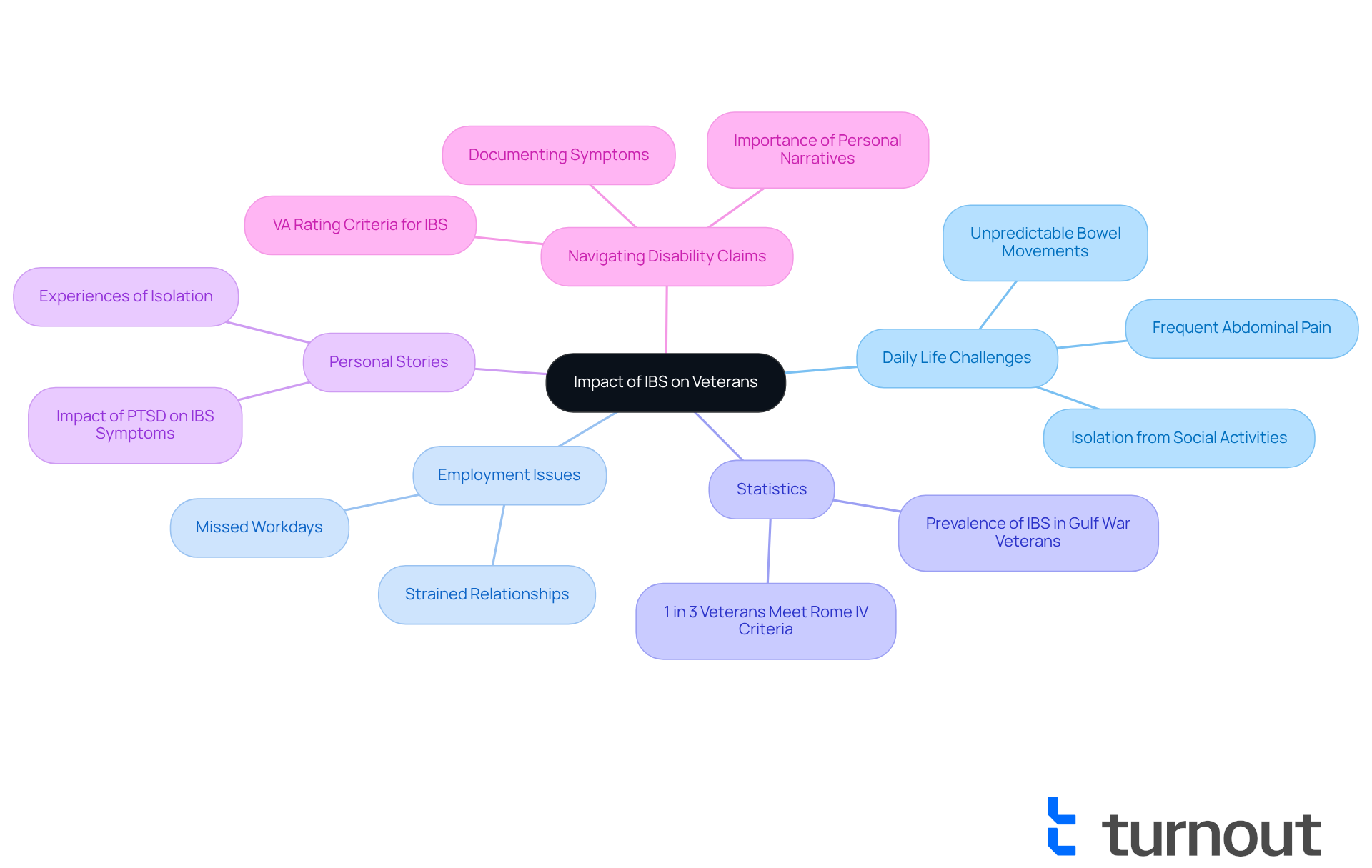
Preparing for Your C&P Exam: Tips for Veterans with IBS
Preparing for a C&P exam for IBS can feel overwhelming, but taking essential steps can make a difference. We understand that reviewing medical records and discussing symptoms in detail is crucial. It's worth noting that about 80% of individuals who keep symptom diaries find it significantly helps them express how IBS affects their daily lives during the exam. This diary serves as concrete evidence, showcasing the real-world effects of their condition. Additionally, it's important to recognize that 80% of former service members report being underrated by the VA, underscoring the need for thorough preparation.
During the exam, honesty and specificity are vital. Veterans should clearly explain how IBS impacts their daily activities, including any disruptions to work and social interactions. The VA looks for clear documentation of symptom patterns to assign appropriate ratings, making this level of detail essential for their assessment. Many former service members have shared that being candid about their experiences during the C&P exam has led to more accurate evaluations and improved outcomes.
You can expect a comprehensive assessment during the C&P exam, which includes a review of your medical history, a physical examination, and possibly diagnostic tests. Key areas of focus will be:
- The frequency and severity of symptoms
- Triggers
- Previous treatments
By preparing adequately and providing thorough information, you can navigate the C&P exam process more effectively, increasing your chances of receiving the appropriate IBS VA disability rating. Remember, IBS can also impact mental health, contributing to anxiety and depression, so it's important to communicate this during the exam. You're not alone in this journey; we're here to help you every step of the way.
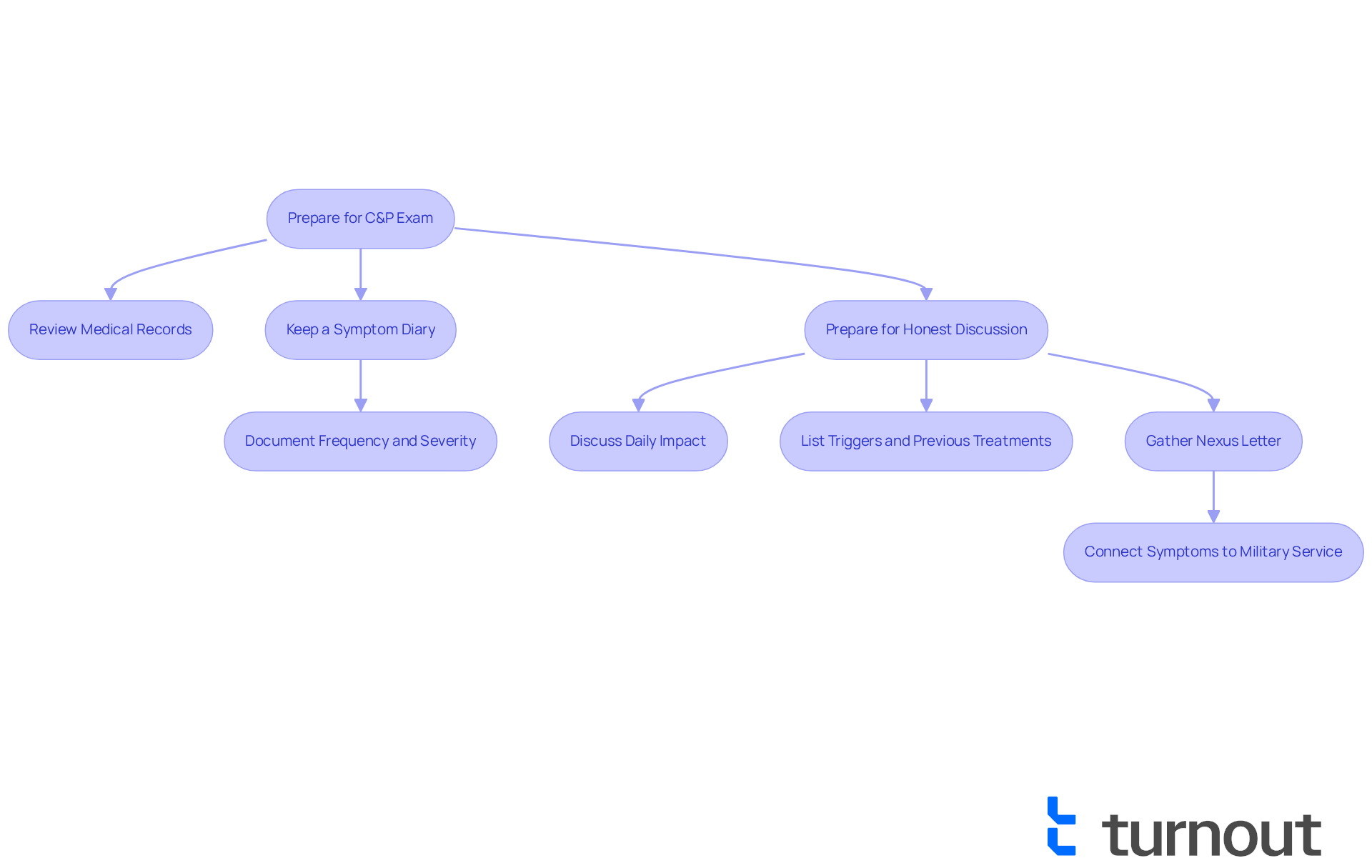
Conclusion
Understanding the intricacies of the IBS VA disability rating process is crucial for veterans seeking the support they deserve. We understand that navigating this process can feel overwhelming, but advancements in technology, such as Turnout, are here to help. These innovations are streamlining the application process, making it more accessible and less burdensome for you.
With a clear understanding of the rating criteria and the importance of thorough documentation, you can confidently navigate your claims and advocate for your rights. Key insights include:
- The significance of establishing a service connection, whether direct or secondary.
- The potential for presumptive conditions that simplify the claims process.
The impact of IBS on daily life and the employment challenges faced by veterans further emphasize the need for comprehensive medical documentation and personal narratives to strengthen your claims. Additionally, we encourage you to prepare for C&P exams by communicating clearly about the effects of your condition.
Ultimately, the journey to secure IBS VA disability benefits can be daunting. But remember, you are not alone. Utilizing available resources, understanding the rating criteria, and maintaining detailed records can significantly enhance your chances of a successful claim. It is vital for you to take proactive steps, seek assistance, and remain informed about your rights. Together, we can ensure you receive the benefits you have earned.
Frequently Asked Questions
What is Turnout and how does it assist with the IBS VA disability claim process?
Turnout is an AI technology platform that simplifies the IBS VA disability rating application process for service members by automating document management and case tracking, ensuring timely updates and assistance throughout the application journey.
What recent advancements have been made in the VA's application processing times?
As of August 2025, the average processing time for VA applications is just 94.8 days, a significant improvement from previous averages, with over 2.524 million requests processed efficiently.
How do veterans feel about the technological improvements in the VA application process?
Veterans have expressed gratitude for the technological improvements, stating that they reduce the stress associated with managing the application process and allow them to focus on their health and well-being.
What is the VA disability rating scale for Irritable Bowel Syndrome (IBS)?
The VA disability rating for IBS is assigned on a scale from 0% to 30%, based on symptom severity and frequency, categorized as follows: 10% for mild symptoms, 20% for moderate symptoms, and 30% for severe symptoms significantly impacting daily life.
Can veterans seek an increase in their IBS VA disability rating?
Yes, veterans currently rated at 0% can seek an increase under the new criteria effective May 19, 2024, by providing thorough documentation of their condition.
How can veterans establish a service connection for IBS?
Veterans can establish a service connection for IBS by submitting medical records confirming a diagnosis, along with a detailed treatment history and a nexus letter from a healthcare provider linking their IBS to military service.
What role does a nexus letter play in the IBS VA disability claim process?
A nexus letter is crucial as it explains how the veteran's IBS relates to their military experience, enhancing the chances of approval for their claim by providing clear medical opinions and evidence.
What is the maximum IBS VA disability rating a veteran can receive?
The maximum IBS VA disability rating a veteran can receive for service-connected IBS is 30%, applicable if the symptoms are classified as severe.
How prevalent is IBS among veterans?
Approximately one-third of women in the Armed Forces experience IBS, and around 230,000 former military personnel currently receive benefits for the condition, highlighting its commonality among service members.




